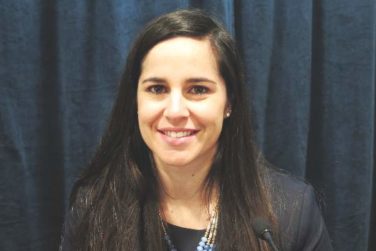FROM THE JOURNAL OF CLINICAL ONCOLOGY
Lenalidomide led to independence from red blood cell transfusions for 27% of patients with lower-risk non-del(5q) myelodysplastic syndromes who were refractory to or ineligible for erythropoiesis-stimulating agents, based on the results of a phase III placebo-controlled study.
Patients were most likely to reach this primary endpoint if their baseline erythropoietin (EPO) level was less than 100 mU/mL, Dr. Valeria Santini of the University of Florence (Italy) and her associates wrote online June 27 in the Journal of Clinical Oncology.
Erythropoiesis-stimulating agents (ESAs) are first-line therapy for anemia in lower-risk myelodysplastic syndrome (MDS) patients without a deletion 5q, but most patients stop responding over time. “Although azacitidine and decitabine are approved in the United States and other countries in this setting, no approved treatments exist in the European Union and other countries for ESA-refractory patients who are dependent on red blood cell transfusions,” the researchers wrote.
Their international double-blind study enrolled 239 adults with International Prognostic Scoring System lower- or intermediate-risk MDS who lacked the del(5q) mutation and needed at least 2 U of packed red blood cells every 28 days. Patients were randomly assigned 2:1 to lenalidomide (160 patients) or placebo (79 patients), given once daily for 28-day cycles. Patients whose creatinine clearance was 40-60 mL/min received 5 mg lenalidomide, while the rest received 10 mg. Randomization was stratified based on MDS treatment history, baseline transfusion requirements, and time from MDS diagnosis (J Clin Oncol. 2016 Jun 27. doi: 10.1200/JCO.2015.66.0118 ). A total of 43 lenalidomide patients (27%) and 2 placebo patients (2.5%; P less than .001) did not require packed red blood cell transfusions for at least 8 weeks. Transfusion independence persisted through 24 weeks for 17% of lenalidomide patients and no placebo patients. Of 39 patients given 5-mg lenalidomide, 18% reached the primary endpoint (P = .006, compared with placebo). The median duration of response was nearly 31 weeks (95% confidence interval, 21-59 weeks). Prior use of ESAs was the only significant predictor of response in the multivariate analysis (odds ratio, 4.6; 95% confidence interval, 1.3-16.1; P = .01), although low baseline transfusion burden reached significance in the univariate model and borderline significance in the multivariate model (OR, 2.7; 95% CI, 0.96-7.6; P = .06).
The highest response rate (43%) occurred among the 40 patients who had previously received ESAs and had a baseline erythropoietin level under 100 mU/mL. The response rates for other patients previously treated with ESAs fell as baseline EPO level increased, and the response rate was only 9% among patients whose relatively high endogenous EPO level had made them ineligible for ESA treatment. “Patients with higher endogenous EPO levels may be less responsive due to marked intrinsic defects in erythroid signaling pathways, including signal transducer and activator of transcription extracellular regulated kinase 1/2, and lipid raft assembly, which are restored or stimulated by lenalidomide exposure,” the researchers wrote.
As in previous studies, grade 3-4 adverse events with lenalidomide usually were due to myelosuppression. Grade 3-4 neutropenia affected 99 lenalidomide patients (62%) and 10 placebo patients (13%). Grade 3-4 thrombocytopenia affected 57 lenalidomide patients (36%) and 3 placebo patients (4%). Lenalidomide was associated with a 3% rate of venous thrombosis but did not cause detectable pulmonary embolism. Lenalidomide was stopped in 32% of patients because of thrombocytopenia, neutropenia, or other adverse events, compared with 11% of placebo patients. In all, 2.5% of patients in each group died while on treatment.
Celgene makes lenalidomide and funded the study. Dr. Santini disclosed consulting or advisory roles and honoraria from Celgene, Janssen Pharmaceuticals, and Novartis. Seventeen coinvestigators also disclosed ties to Celgene.






